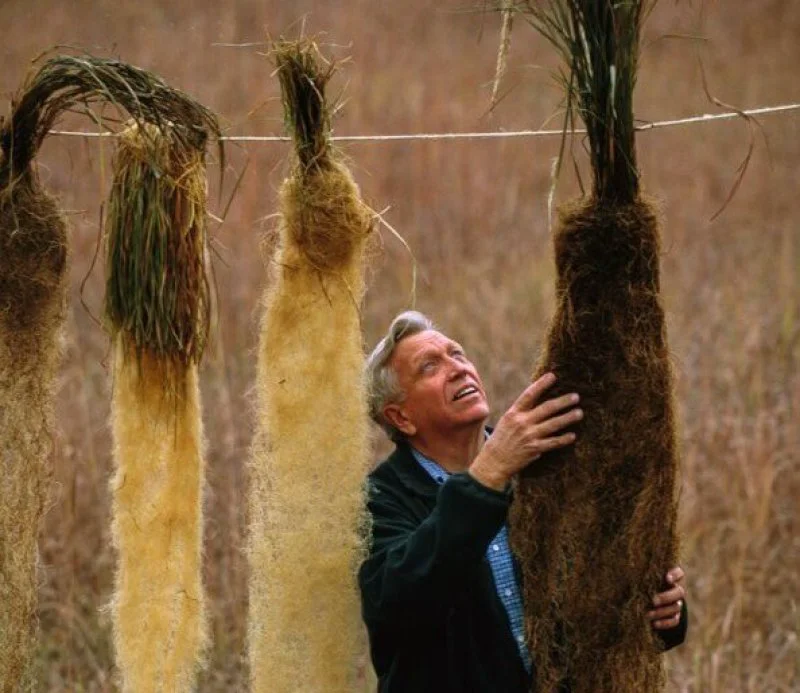Meet Kernza, the climate change-fighting seed: Wheatgrass perfect for baking that sustainably grows back year after year
Meet Kernza, the climate change-fighting seed: Wheatgrass perfect for baking that sustainably grows back year after year


Most commercial crops are annual. They provide only one harvest and must be replanted every year. Growing these foods on an industrial scale usually takes huge amounts of water, fertilizer and energy, making agriculture a major source of carbon and other pollutants. Scientists say this style of farming has imperiled Earth’s soils, destroyed vital habitats and contributed to the dangerous warming of our world.
But Kernza — a domesticated form of wheatgrass developed by scientists at the nonprofit Land Institute — is perennial. A single seed will grow into a plant that provides grain year after year after year. It forms deep roots that store carbon in the soil and prevent erosion. It can be planted alongside other crops to reduce the need for fertilizer and provide habitat for wildlife.
In short, proponents say, it can mimic the way a natural ecosystem works — potentially transforming farming from a cause of environmental degradation into a solution to the planet’s biggest crises.
Kernza has a long road from the laboratory to the kitchen table. It will be even harder to transform the farming practices that humans have relied on for most of history. But if the scientists, farmers and processors are successful, perennial foods might one day be available on grocery store shelves.
This is an excerpt. Read the original post here.

 | Videos | More... |

Video: Nuclear energy will destroy us? Global warming is an existential threat? Chemicals are massacring bees? Donate to the Green Industrial Complex!
 | Bees & Pollinators | More... |

GLP podcast: Science journalism is a mess. Here’s how to fix it

Mosquito massacre: Can we safely tackle malaria with a CRISPR gene drive?

Are we facing an ‘Insect Apocalypse’ caused by ‘intensive, industrial’ farming and agricultural chemicals? The media say yes; Science says ‘no’
 | Infographics | More... |

Infographic: Global regulatory and health research agencies on whether glyphosate causes cancer
 | GMO FAQs | More... |

Why is there controversy over GMO foods but not GMO drugs?

How are GMOs labeled around the world?

How does genetic engineering differ from conventional breeding?
 | GLP Profiles | More... |

Alex Jones: Right-wing conspiracy theorist stokes fear of GMOs, pesticides to sell ‘health supplements’




 Viewpoint — Fact checking MAHA mythmakers: How wellness influencers and RFK, Jr. undermine American science and health
Viewpoint — Fact checking MAHA mythmakers: How wellness influencers and RFK, Jr. undermine American science and health Viewpoint: Video — Big Solar is gobbling up productive agricultural land and hurting farmers yet providing little energy or sustainabilty gains
Viewpoint: Video — Big Solar is gobbling up productive agricultural land and hurting farmers yet providing little energy or sustainabilty gains Trust issues: What happens when therapists use ChatGPT?
Trust issues: What happens when therapists use ChatGPT? Fighting deforestation with CO2: Biotechnology breakthrough creates sustainable palm oil alternative for cosmetics
Fighting deforestation with CO2: Biotechnology breakthrough creates sustainable palm oil alternative for cosmetics California, Washington, Oregon forge immunization alliance to safeguard vaccine access against federal undermining
California, Washington, Oregon forge immunization alliance to safeguard vaccine access against federal undermining 30-year-old tomato line shows genetic resistance to devastating virus
30-year-old tomato line shows genetic resistance to devastating virus The free-range chicken dilemma: Better for birds, but with substantial costs
The free-range chicken dilemma: Better for birds, but with substantial costs ‘You have to treat the brain first’: Rethinking chronic pain with Sanjay Gupta
‘You have to treat the brain first’: Rethinking chronic pain with Sanjay Gupta
